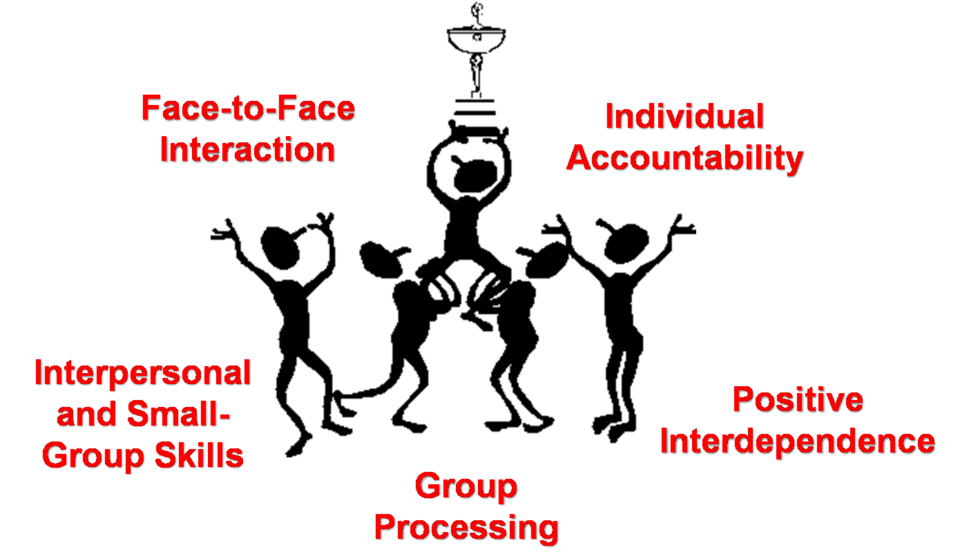
One component of a cooperative learning lesson, is that in the cooperative learning lesson, you must facilitate the 5 PIGS.
Positive Interdependence
Positive interdependence is when members of a group understand that they must work together in order to successfully complete the group's task. There are nine aspects of positive interdependence. The first aspect is that students groups should share a common gaol and that goal should be made clear by the teacher. The second aspect is that each student should have a specific role within their group. The third aspect is that students should share the resources they are using. The fourth aspect is that students should receive incentives for working well together. The fifth aspect is that students should be set up in a competitive environment. The six aspect is that students should work around a defined are. The seventh aspect is that students should design a group name. The eight aspect is that each student must have a task that needs to be completed in order to complete the final project. The ninth aspect is that you the students should use the roles to act out a situation or resolution.
Individual Accountability
Individual accountability is knowing that each individual is accountable for their work, and their learning. It is important for students to learn about individual accountability when they are participating in group work because you want them to understand that they are responsible for their contribution to the group work. Teaching individual accountability prevents students from "freeloading" during the lesson or waiting for their group mates to do all the work. When you teach students individual accountability, you teach them that they have to contribute to the group work and that their contribution should be meaningful. One way in which you can prove individual accountability is by assigning students roles within their groups. These roles can be a number of things such as leader or scribe or time keeper, etc. You can also promote individual accountability by keeping group sizes small, by observing each group and its group members as they work and by checking for understanding, and by having student complete self evaluation forms. Teachers should teach their students about individual accountability during the development of their lesson. They can teach students about individual accountability by talking to students about what makes a good group and their role in a group activity.
Group Processing
Group Processing is when group members analyze their own and the group's ability to work together. The purpose of group processing is that it focuses attention on group members' contributions in order to increase individual accountability, it allows the group to improve its work together continuously over time, it reduces actions that don't contribute positively to the group's learning and it makes the learning process simpler. Group processing belongs in the closure of a lesson. There are four keep components of group processing. The first component is feedback. Each student in the group must give and receive positive feedback on their contribution to the group. The second component is reflection. Students must analyze and reflect on the feedback they've been given. The third component is improvement goals. Individual students and groups must set goals fro improving their work. The fourth component is celebration. Groups must celebrate the hard work and contribution of each group member as well as the success of the group.
Social skills are the skills we need to interact adaptively in our cultural environment. Social skills include things such as communicating clearly, taking turns, listening actively, sharing ideas, etc. For a cooperative learning lesson, students need forming skills, functioning skills, formulating skills and fermenting skills. You can include forming skills in a cooperative learning lesson by having a noise monitor, a voice monitor, and a turn taking monitor. Functioning skills are the skills needed to manage the group's activities to complete a task and maintain effective working relationships among members. Functioning skills allow students to share ideas and opinions, ask for facts, and give directions to group members. Formulating skills help maximize students learning. They use higher reasoning strategies to strengthen mastery and retention of the learned topic. Fermenting skills are needed for the students to give appropriate feedback and have academic conservations with each other. You can teach social skills by emphasizing the importance of teamwork skill. Teaching students social skills helps improve their personal development and identity, it helps enhance their skills for future career success, it helps improve their quality of life, it helps improve their physical and psychological health and it helps improve their ability to cope with stress.
Face to Face Interaction
Face to Face Interaction is when students promote each other's success by sharing resources through conversation and discussion. In face to face interactions, students help support, encourage, and praise each other's efforts to learn. The goals of face to face interaction are academic and social leaning/progress. In face to face interactions, a student orally explains how to solve a problem, a group member teaches classmates about a topic, and students help each other connect present and past learning.
Face to Face Interaction
Face to Face Interaction is when students promote each other's success by sharing resources through conversation and discussion. In face to face interactions, students help support, encourage, and praise each other's efforts to learn. The goals of face to face interaction are academic and social leaning/progress. In face to face interactions, a student orally explains how to solve a problem, a group member teaches classmates about a topic, and students help each other connect present and past learning.



No comments:
Post a Comment